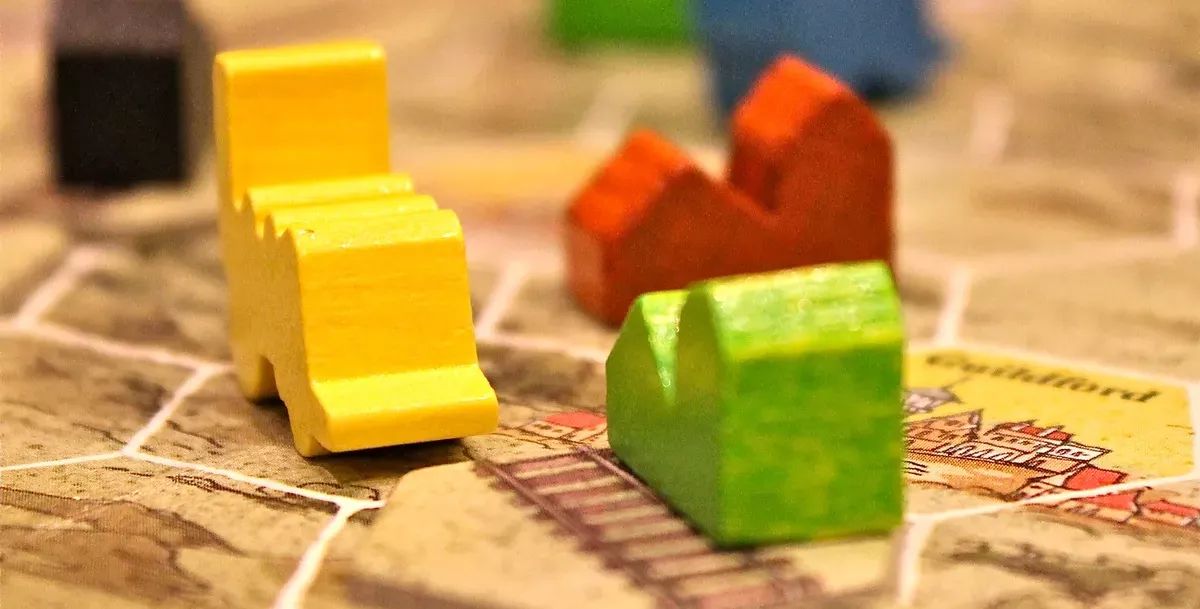twelve game mechanics

a handful of people sit at a table, temporarily bind by a honorable agreement that those are the rules to be followed for the next couple of hours. for the past two years I’ve been drawn to board games.
it’s always fun to start a new hobby: you discover this one new thing - free of responsibilities - that makes you feel excited, and you wanna tell everyone about it and why it is oh so great.
you gradually unveil each layer of it, try a bit of everything and possibly discover how deep the rabbit hole goes.
somewhere along the way you refine your taste and learn what aspects of it you like the most.
I’ve always been an eclectic gamer. I think I’m too interested in game design to dismiss anything.
with board games it’s no different, but some game traits have been recurring across the different games I’ve been bringing to the table as of late:
1. turn-based:
I do something, then you do something, then they do something (…)
and orderly it goes.
after each turn the (shared) board is transformed and the next player has to adapt to the new state of the game.
for the competitive player, a sour “oh no, you screwed my plans!” is the best kind of compliment.
2. very few & meaningful actions:
I love the first 60 turns of Sid Meier’s Civilization V:
you’re surrounded by fog of war and usually you have no more than 3 or 4 units. every decision feels impactful - and every loss catastrophic.
when you get to the mid game, it starts to turn into a management game - specially if you go for a wide empire, and by the late-game, turns start to drag on and I always find myself sorting through all the units that still need new orders.
this gets aggravated in online play, to the point that I’m unsure if I ever finished a multiplayer game.
I love games where you are limited to 1 or 2 simple actions on your turn, and their implications to the state of the game are very clear to everyone.
it makes games easier for new players and may lead to fast, snappy turns.
3. hidden information:
modern board game designers want to leave no person behind. or, at least, give the impression that no one is behind.
another player may have a great lead on you, but the game still makes feel like you have a shot at it, which makes everyone at the table feel involved from beginning till the end.
4. push your luck:
luck has been in decline for a while now as being a great factor in modern board games - in many cases it seems to be there just to play the role of something like ‘randomize()’
I love deep, pure, mind-melting strategy games, but nothing can beat the roaring excitement of doing something really reckless.
independently of the outcome, everyone at the table will be at the edge of their seat and will have a story to tell.
5. shared incentives:
you get this, I get that.
I win, you win, everybody wins.
6. tile placement:
pick a tile. place a tile.
so simple, and yet highly engaging and gratifying.
in an intimate environment it can be almost meditative.
7. set collection:
this one gives everyone a feeling of achievement, of getting something done. it also helps newcomers, as it gives them some sort of direction.
it gives birth to sub-plots during the gaming sessions: for one, if you’re the only one aiming for a specific set, it might feel like you’re doing your thing “on the side”, apart from the crowd. but if someone gets in your territory and starts to take those cards from your reach, it feels like a personal attack and they must be punished by their transgression.
8. area majority:
no room for abstraction.
whoever gets the most stuff on the board wins.
9. open drafting:
everything is up for grabs.
if well implemented, the decision is not easy and, for each great thing you get, you’re giving up something valuable.
10. variable set-up:
if the core gameplay is great, you want more of it.
variable set-up keeps things fresh and reduces go-to strategies.
11. auction/bidding:
few activities are more social then having people bargaining contemporary art or making deals for future trades of coffee beans.
12. variable phase order:
the ultimate trade-off: you wanna go first on the next turn, or get a better reward?
will you choose to have the opportunity to place your piece in the best spot before anyone else, and risk being cut-off? or will you opt for going last, and have all the information of everyone else’s plans?